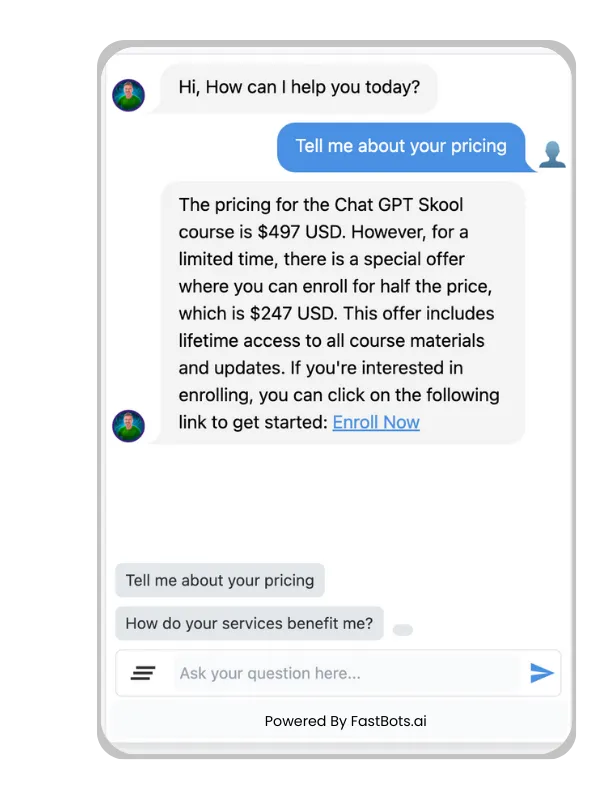WhatsApp automation is becoming increasingly popular for SaaS businesses looking to streamline their communications and enhance customer engagement. By leveraging the power and widespread usage of the WhatsApp platform, businesses can efficiently manage customer interactions and improve the overall customer experience.
By adopting WhatsApp automation, your company can benefit from a range of features, including predefined message templates, automated responses, and integration with your existing CRM systems. This helps you save time while ensuring consistent and professional communication with your clients.
Moreover, implementing WhatsApp automation for your business can lead to increased customer satisfaction, helping to foster long-term customer relationships. It's essential for SaaS businesses to stay ahead in the competitive market by exploring and adopting modern communication technologies such as WhatsApp automation.
Overview of WhatsApp Automation
Benefits for SaaS Businesses
WhatsApp automation offers a myriad of advantages that significantly enrich the customer experience for SaaS businesses. Firstly, it simplifies customer engagement and support, resulting in exceptional user experiences. By automating certain aspects of your customer communication, you can ensure prompt and personalised responses, leading to increased customer satisfaction.
Secondly, this powerful tool can boost sales by offering familiar and comfortable communication channels that users are accustomed to. WhatsApp, being one of the most widely used messaging platforms worldwide, provides an instant connection with potential clients. This seamless communication leads to establishing trust and fostering long-term customer relationships.
Additionally, it allows for building automation flows for industry-specific purposes such as appointment booking or sales funnel management.
Core Features of WhatsApp Automation Tools
1. Customised automated replies: Take advantage of automated messaging and tailor responses to fit your customers' needs, providing a personalised experience even when you're not available for direct communication.
2. Interactive flows: Design, build, and customise your own customer journeys with tools that offer chatbot and AI integration. These flows help guide users through your product or service offerings with ease.
3. Integration with other software: Many WhatsApp automation tools integrate with popular CRM platforms and other SaaS solutions to streamline your workflows and manage customer communication more effectively.
4. Message templates and labels: organise your conversations with message templates, labels, and folders to keep track of the different types of interactions and requirements.
5. Rich media support: enrich your customer interactions by sending and receiving various media types, such as images, documents, and videos.
In summary, incorporating WhatsApp automation into your SaaS business strategy can make a significant impact on customer engagement, satisfaction, and sales. By leveraging its core features, you can create a solid foundation for sustainable growth and profitability.
BUILD YOUR OWN WHATSAPP AI CHATBOT
In less than 5 minutes, you could have an AI chatbot fully trained on your business data assisting your Website visitors.
Setting up WhatsApp automation
Choosing the Right Platform
To set up WhatsApp automation for your SaaS business, you must first choose the right platform. There are several options available, such as the WhatsApp Business App and WhatsApp Business API. Consider the size and needs of your business before making a decision. For instance:
- WhatsApp Business App: Suitable for small and medium-sized businesses, this app provides fundamental automation features like quick replies, away messages, and greeting messages.
- WhatsApp Business API: Ideal for larger enterprises, this API offers enhanced automation capabilities and better integration with SaaS applications and communication platforms.
Integration with SaaS operations
Once you've chosen the appropriate platform, the next step is to integrate it with your SaaS operations. Here are a few points to consider:
1. Existing SaaS Tools: Determine how WhatsApp automation will fit into your existing business tools, such as your customer relationship management (CRM) system, helpdesk, or marketing automation software. For seamless integration, ensure compatibility between the chosen platform and your existing tools.
2. Workflow Automation: Define the workflows that you wish to automate with WhatsApp, such as customer support ticket management, marketing campaigns, or sales processes. By doing so, you can efficiently address customer queries and manage high volumes of tasks.
3. Customisations: Tailor your WhatsApp automation according to your business requirements. Customise templates, language preferences, and message flows to provide a personalised experience for your customers.
4. Testing and Monitoring: Test your WhatsApp automation setup to ensure proper functioning and monitor its performance. Regular evaluation helps in identifying areas for improvement and further enhancing the customer experience.
In conclusion, setting up WhatsApp automation for your SaaS business entails selecting the right platform and integrating it with your existing operations. By doing so, you'll be able to streamline workflows, reduce manual efforts, and provide quick, efficient support to your customers.
Best Practices in WhatsApp Automation
Developing Effective Chatbots
To create an effective chatbot for your SaaS business, first identify the tasks and processes you want to automate. Understand your target audience and their needs to ensure your chatbot provides relevant and accurate information. Make use of a conversational UI, incorporate natural language processing (NLP), and carry out regular testing to continually improve the performance of your chatbot. Additionally, consider integrating your WhatsApp chatbot with your existing CRM or help desk systems to gather customer data and provide personalised responses.
Maintaining customer engagement
Engaging customers and leads through WhatsApp automation is crucial for nurturing relationships and moving them further down the sales funnel. Here are a few tips to maintain customer engagement:
1. Provide 24/7 availability: Ensure your chatbot is capable of handling queries and providing support round the clock to cater to customers from different time zones.
2. Quicker response times: Respond to user queries promptly, ideally within a few seconds, to create a positive user experience.
3. Personalisation: Use the customer data at your disposal to send targeted, personalised messages and increase relevance.
4. Keep the conversation focused. Don't overwhelm users with too many options or pieces of information. Provide concise, clear responses and guide users to the next step in the conversation.
Ensuring compliance and privacy
When using WhatsApp automation for your business, it's essential to follow all platform guidelines and adhere to privacy regulations such as GDPR. Some key practices include:
- Obtain user consent: Always ask for permission before sending messages to users and provide an opt-out option to comply with data protection regulations.
- Limiting automated messages: Keep in mind that WhatsApp Business has some limitations on automated messaging. Stick to the guidelines to avoid any violations.
- Secure data storage: Store and process customer data securely to protect user privacy and ensure compliance with data protection legislation.
By following these best practices in WhatsApp automation, you'll be well on your way to providing an efficient and engaging customer experience through this popular messaging platform.
Case Studies: WhatsApp Automation in Action
Success stories from the SaaS industry
Lenovo: Lenovo utilised WhatsApp Flows to streamline their appointment booking process. They achieved a remarkable 8.2x increase in appointment bookings compared to their previous methods. By leveraging WhatsApp automation, Lenovo streamlined customer communication and improved its customer experience.
Sefamerve: Another success story comes from Sefamerve, an e-commerce company that implemented WhatsApp Flows to enhance customer engagement. They experienced a 150% boost in conversion rates, demonstrating the power of WhatsApp automation in driving business results.
Key benefits observed:
- Increased productivity and efficiency in managing customer queries
- Enhanced customer experience and quicker response times
- 24/7 availability for users to interact with businesses
Analysis of Automation Impact
To better understand the impact WhatsApp automation has on businesses, particularly in the SaaS industry, we can examine several factors:
1. Efficiency: Automation streamlines the process of handling customer inquiries and support tickets. Businesses can prioritise and resolve issues more efficiently by automatically assigning and categorising incoming messages.
2. Productivity: By reducing manual efforts, businesses can efficiently manage a high volume of queries and tasks without overburdening support teams.
3. User Satisfaction: WhatsApp automation enables businesses to have continuous interaction with users, offering support around the clock, which increases user satisfaction and fosters brand loyalty.
In summary, WhatsApp automation offers a powerful solution for SaaS businesses to improve their customer experience, increase productivity, and achieve better results. With its ever-growing user base, this messaging platform has become a valuable tool in the ever-evolving world of business communication.

Future Trends in WhatsApp Automation
Technological Advancements
As we move further into the digital age, WhatsApp automation technologies will continue to evolve, making it easier for SaaS businesses to streamline their workflows. The use of artificial intelligence (AI) and machine learning will likely play a significant role in improving chatbots and virtual assistants, allowing for more personalised customer interactions. Moreover, the implementation of natural language processing (NLP) will enhance the understanding of customer queries, making interactions feel more human-like.
One exciting development to watch for is the integration of voice and video assistants within WhatsApp automation, which will provide an even more engaging customer experience. Additionally, you can expect improvements in data analytics and reporting tools that will help businesses make more informed decisions based on customer behaviour and preferences.
Predictions for SaaS Adoption
As technological advancements continue to transform the automation landscape, the widespread adoption of SaaS solutions is expected to become an essential part of achieving business success. With more companies turning to cloud-based services and the rapid rise of remote workforces, the convenience and flexibility of SaaS will be key to staying competitive. Here are a few predictions for SaaS adoption in the coming years:
- Increased focus on security: As businesses invest more in SaaS solutions, the demand for robust security measures will continue to grow. Expect to see more partnerships and investments in creating secure platforms so you can safely transmit customer data.
- More emphasis on integrations: seamless integration between various SaaS applications will become crucial. With the growing popularity of platforms like Zapier, businesses will prioritise products that can easily be integrated with their existing tech stack.
- Rise in industry-specific SaaS: As more companies transition to SaaS solutions, the need for industry-specific services will grow. Niche SaaS platforms that cater to the unique needs of a specific sector, such as healthcare or education, will become increasingly popular.
- Growth of no-code/low-code: Non-technical and indistinct entrepreneurs will be on the lookout for easy-to-use tools that can enable rapid development and deployment of SaaS applications. This will boost the popularity of no-code and low-code platforms, vastly expanding the SaaS market.
In conclusion, as WhatsApp automation technologies continue to advance, you can look forward to a more seamless customer experience, more robust security measures, and a rise in industry-specific SaaS solutions. These developments will play a crucial role in shaping the future of SaaS businesses and their ability to stay ahead in this competitive landscape.
Frequently Asked Questions
How can businesses implement automation with WhatsApp?
Are there any cost-free solutions for automating WhatsApp in a SaaS context?
What are some common examples of WhatsApp automation in action?
1. Efficient ticket management: streamlining the process of handling customer inquiries and support tickets by automatically assigning and categorising incoming messages.
2. 24/7 availability: maintaining continuous interaction with users and offering support at any time.
3. Streamlining business processes: automating routine tasks such as sending order confirmations, appointment reminders, and delivery updates.
Can Python be used for automating WhatsApp interactions?
Does WhatsApp offer a free API for message automation purposes?
BUILD YOUR OWN WHATSAPP AI CHATBOT
In less than 5 minutes, you could have an AI chatbot fully trained on your business data assisting your Website visitors.


